新概念第三册Lesson 40 Who's who讲义
文档属性
| 名称 | 新概念第三册Lesson 40 Who's who讲义 | 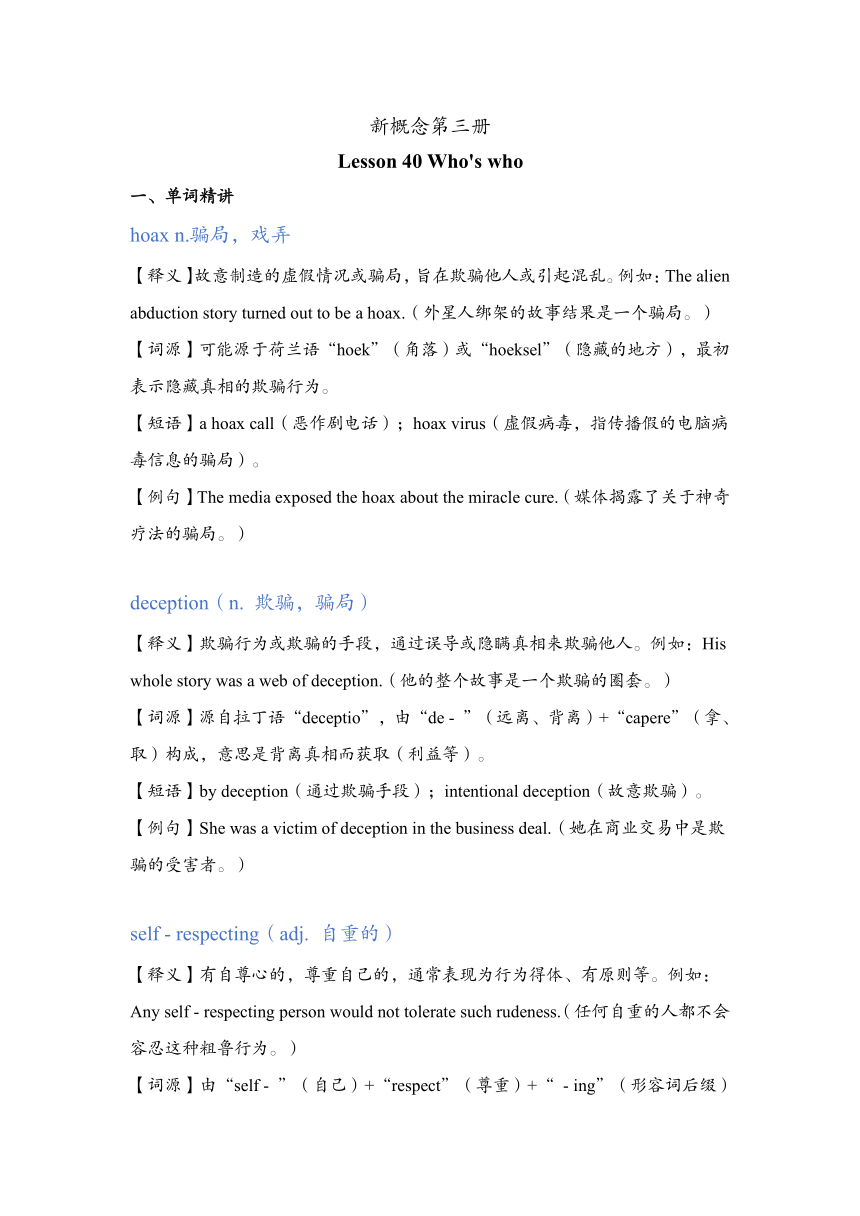 | |
| 格式 | docx | ||
| 文件大小 | 334.7KB | ||
| 资源类型 | 教案 | ||
| 版本资源 | 新概念英语 | ||
| 科目 | 英语 | ||
| 更新时间 | 2024-12-05 10:12:00 | ||
图片预览

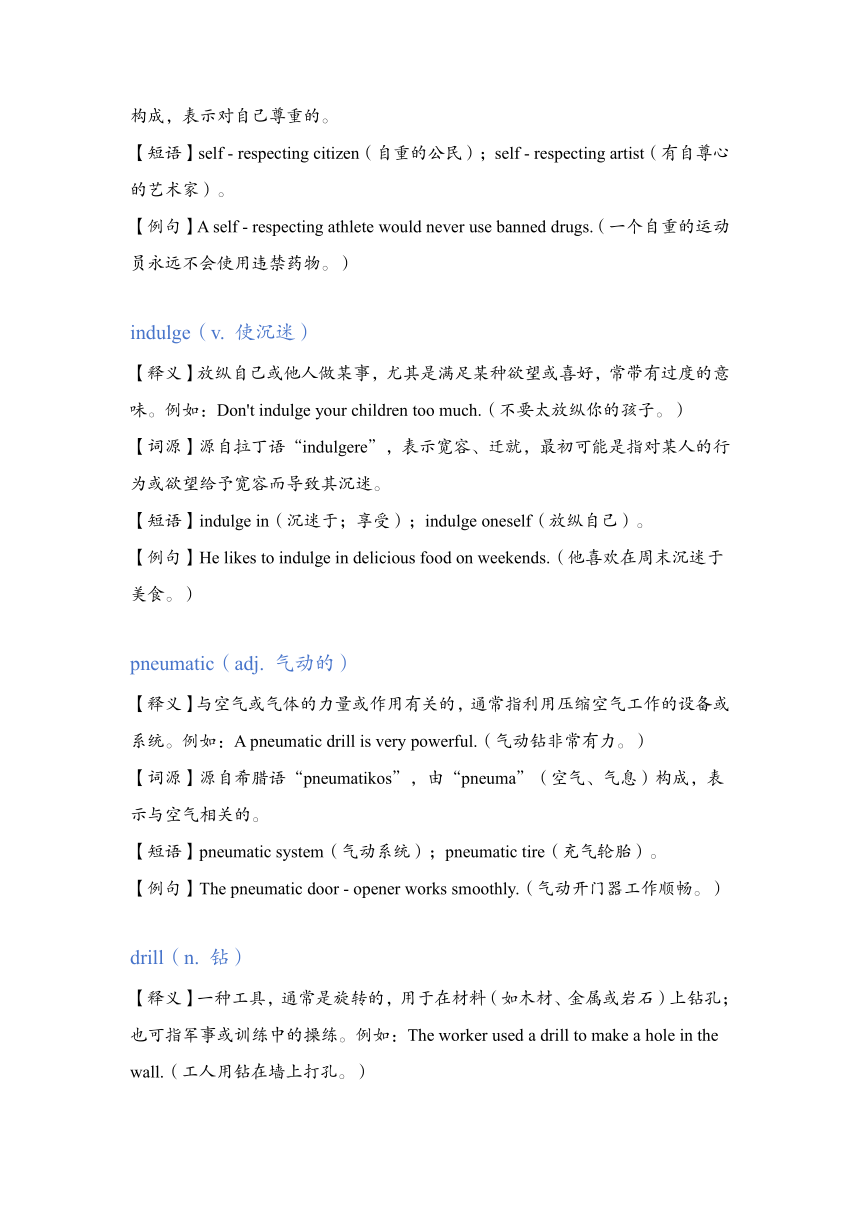
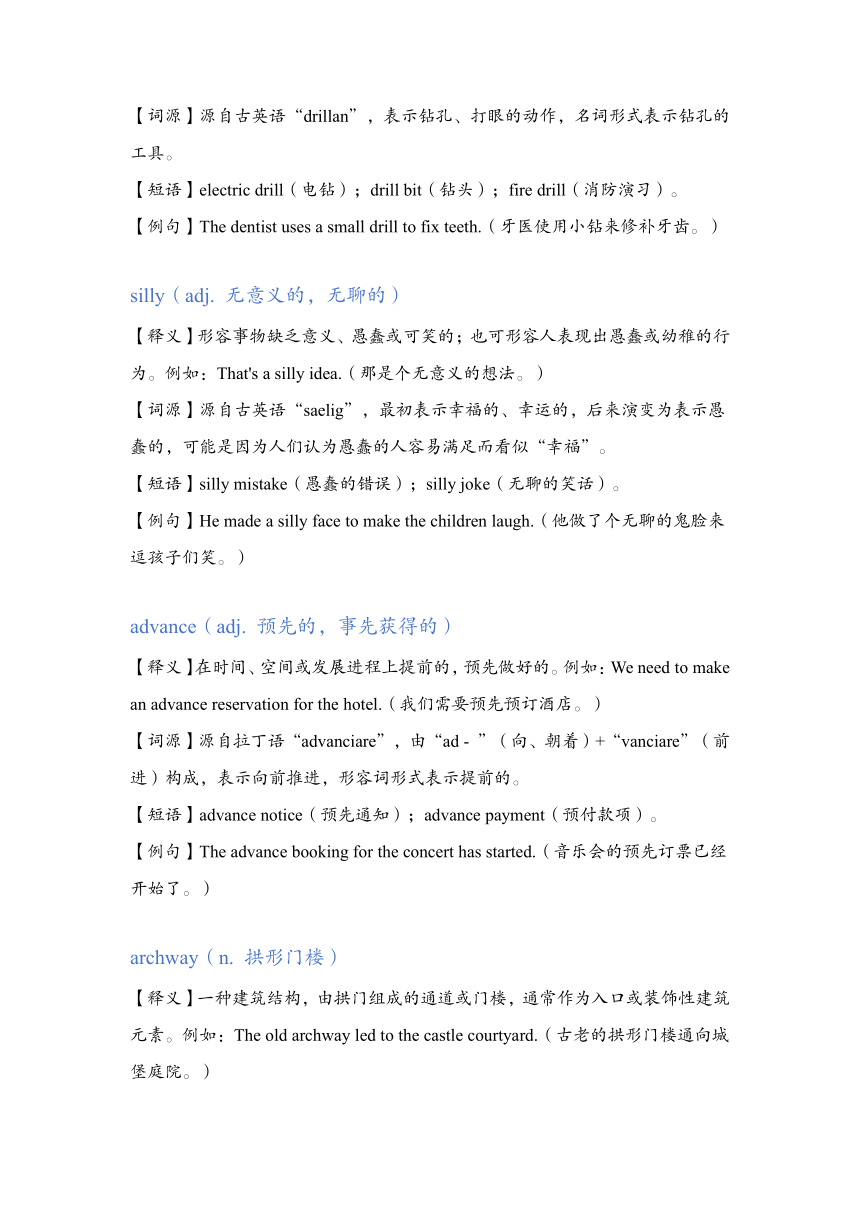
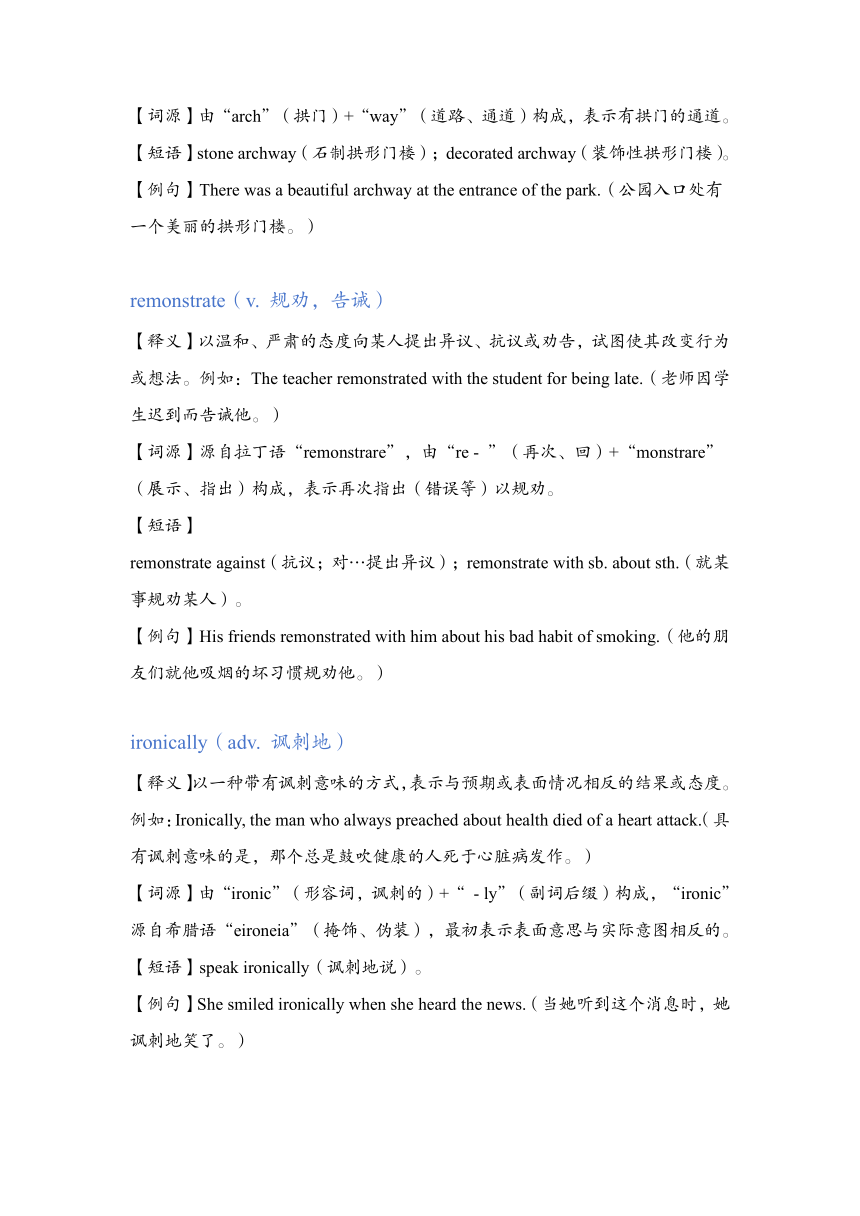
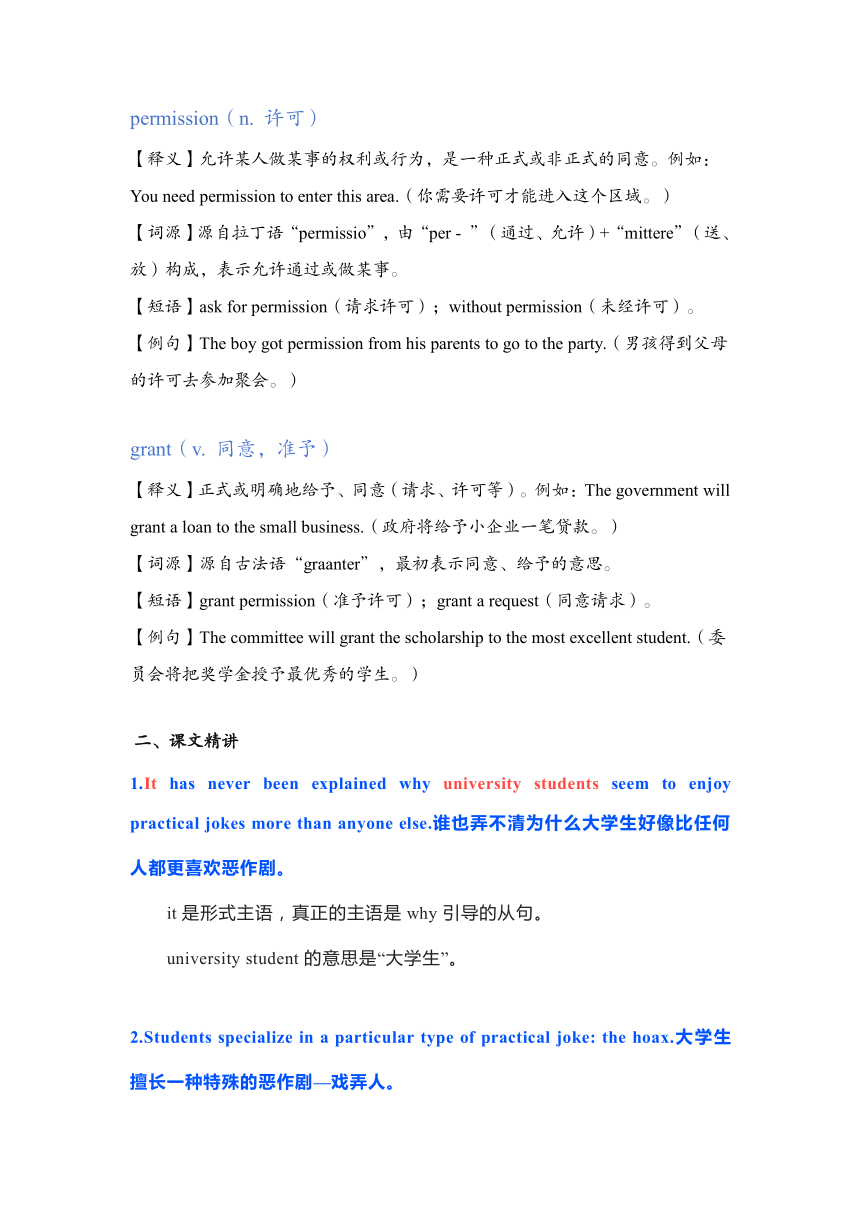
文档简介
新概念第三册
Lesson 40 Who's who
单词精讲
hoax n.骗局,戏弄
【释义】故意制造的虚假情况或骗局,旨在欺骗他人或引起混乱。例如:The alien abduction story turned out to be a hoax.(外星人绑架的故事结果是一个骗局。)
【词源】可能源于荷兰语“hoek”(角落)或“hoeksel”(隐藏的地方),最初表示隐藏真相的欺骗行为。
【短语】a hoax call(恶作剧电话);hoax virus(虚假病毒,指传播假的电脑病毒信息的骗局)。
【例句】The media exposed the hoax about the miracle cure.(媒体揭露了关于神奇疗法的骗局。)
deception(n. 欺骗,骗局)
【释义】欺骗行为或欺骗的手段,通过误导或隐瞒真相来欺骗他人。例如:His whole story was a web of deception.(他的整个故事是一个欺骗的圈套。)
【词源】源自拉丁语“deceptio”,由“de - ”(远离、背离)+“capere”(拿、取)构成,意思是背离真相而获取(利益等)。
【短语】by deception(通过欺骗手段);intentional deception(故意欺骗)。
【例句】She was a victim of deception in the business deal.(她在商业交易中是欺骗的受害者。)
self - respecting(adj. 自重的)
【释义】有自尊心的,尊重自己的,通常表现为行为得体、有原则等。例如:Any self - respecting person would not tolerate such rudeness.(任何自重的人都不会容忍这种粗鲁行为。)
【词源】由“self - ”(自己)+“respect”(尊重)+“ - ing”(形容词后缀)构成,表示对自己尊重的。
【短语】self - respecting citizen(自重的公民);self - respecting artist(有自尊心的艺术家)。
【例句】A self - respecting athlete would never use banned drugs.(一个自重的运动员永远不会使用违禁药物。)
indulge(v. 使沉迷)
【释义】放纵自己或他人做某事,尤其是满足某种欲望或喜好,常带有过度的意味。例如:Don't indulge your children too much.(不要太放纵你的孩子。)
【词源】源自拉丁语“indulgere”,表示宽容、迁就,最初可能是指对某人的行为或欲望给予宽容而导致其沉迷。
【短语】indulge in(沉迷于;享受);indulge oneself(放纵自己)。
【例句】He likes to indulge in delicious food on weekends.(他喜欢在周末沉迷于美食。)
pneumatic(adj. 气动的)
【释义】与空气或气体的力量或作用有关的,通常指利用压缩空气工作的设备或系统。例如:A pneumatic drill is very powerful.(气动钻非常有力。)
【词源】源自希腊语“pneumatikos”,由“pneuma”(空气、气息)构成,表示与空气相关的。
【短语】pneumatic system(气动系统);pneumatic tire(充气轮胎)。
【例句】The pneumatic door - opener works smoothly.(气动开门器工作顺畅。)
drill(n. 钻)
【释义】一种工具,通常是旋转的,用于在材料(如木材、金属或岩石)上钻孔;也可指军事或训练中的操练。例如:The worker used a drill to make a hole in the wall.(工人用钻在墙上打孔。)
【词源】源自古英语“drillan”,表示钻孔、打眼的动作,名词形式表示钻孔的工具。
【短语】electric drill(电钻);drill bit(钻头);fire drill(消防演习)。
【例句】The dentist uses a small drill to fix teeth.(牙医使用小钻来修补牙齿。)
silly(adj. 无意义的,无聊的)
【释义】形容事物缺乏意义、愚蠢或可笑的;也可形容人表现出愚蠢或幼稚的行为。例如:That's a silly idea.(那是个无意义的想法。)
【词源】源自古英语“saelig”,最初表示幸福的、幸运的,后来演变为表示愚蠢的,可能是因为人们认为愚蠢的人容易满足而看似“幸福”。
【短语】silly mistake(愚蠢的错误);silly joke(无聊的笑话)。
【例句】He made a silly face to make the children laugh.(他做了个无聊的鬼脸来逗孩子们笑。)
advance(adj. 预先的,事先获得的)
【释义】在时间、空间或发展进程上提前的,预先做好的。例如:We need to make an advance reservation for the hotel.(我们需要预先预订酒店。)
【词源】源自拉丁语“advanciare”,由“ad - ”(向、朝着)+“vanciare”(前进)构成,表示向前推进,形容词形式表示提前的。
【短语】advance notice(预先通知);advance payment(预付款项)。
【例句】The advance booking for the concert has started.(音乐会的预先订票已经开始了。)
archway(n. 拱形门楼)
【释义】一种建筑结构,由拱门组成的通道或门楼,通常作为入口或装饰性建筑元素。例如:The old archway led to the castle courtyard.(古老的拱形门楼通向城堡庭院。)
【词源】由“arch”(拱门)+“way”(道路、通道)构成,表示有拱门的通道。
【短语】stone archway(石制拱形门楼);decorated archway(装饰性拱形门楼)。
【例句】There was a beautiful archway at the entrance of the park.(公园入口处有一个美丽的拱形门楼。)
remonstrate(v. 规劝,告诫)
【释义】以温和、严肃的态度向某人提出异议、抗议或劝告,试图使其改变行为或想法。例如:The teacher remonstrated with the student for being late.(老师因学生迟到而告诫他。)
【词源】源自拉丁语“remonstrare”,由“re - ”(再次、回)+“monstrare”(展示、指出)构成,表示再次指出(错误等)以规劝。
【短语】
remonstrate against(抗议;对…提出异议);remonstrate with sb. about sth.(就某事规劝某人)。
【例句】His friends remonstrated with him about his bad habit of smoking.(他的朋友们就他吸烟的坏习惯规劝他。)
ironically(adv. 讽刺地)
【释义】以一种带有讽刺意味的方式,表示与预期或表面情况相反的结果或态度。例如:Ironically, the man who always preached about health died of a heart attack.(具有讽刺意味的是,那个总是鼓吹健康的人死于心脏病发作。)
【词源】由“ironic”(形容词,讽刺的)+“ - ly”(副词后缀)构成,“ironic”源自希腊语“eironeia”(掩饰、伪装),最初表示表面意思与实际意图相反的。
【短语】speak ironically(讽刺地说)。
【例句】She smiled ironically when she heard the news.(当她听到这个消息时,她讽刺地笑了。)
permission(n. 许可)
【释义】允许某人做某事的权利或行为,是一种正式或非正式的同意。例如:You need permission to enter this area.(你需要许可才能进入这个区域。)
【词源】源自拉丁语“permissio”,由“per - ”(通过、允许)+“mittere”(送、放)构成,表示允许通过或做某事。
【短语】ask for permission(请求许可);without permission(未经许可)。
【例句】The boy got permission from his parents to go to the party.(男孩得到父母的许可去参加聚会。)
grant(v. 同意,准予)
【释义】正式或明确地给予、同意(请求、许可等)。例如:The government will grant a loan to the small business.(政府将给予小企业一笔贷款。)
【词源】源自古法语“graanter”,最初表示同意、给予的意思。
【短语】grant permission(准予许可);grant a request(同意请求)。
【例句】The committee will grant the scholarship to the most excellent student.(委员会将把奖学金授予最优秀的学生。)
二、课文精讲
1.It has never been explained why university students seem to enjoy practical jokes more than anyone else.谁也弄不清为什么大学生好像比任何人都更喜欢恶作剧。
it是形式主语,真正的主语是why引导的从句。
university student的意思是“大学生”。
2.Students specialize in a particular type of practical joke: the hoax.大学生擅长一种特殊的恶作剧—戏弄人。
冒号之后的内容起进一步解释说明的作用。
3.Inviting the fire brigade to put out a nonexistent fire is a crude form of deception which no self-respecting student would ever indulge in.请消防队来扑灭一场根本没有的大火是一种低级骗局,有自尊心的大学生决不会去做。
inviting…a nonexistent fire是现在分词短语,作主语。Which引导定语从句,修饰deception。
4.Students often create amusing situations which are funny to everyone except the victims. 大学生们常常做的是制造一种可笑的局面,使大家笑上一场,当然受害者是笑不出来的。
which引导定语从句,修饰situations,说明“是…的局面”。
victim表示“受害者”。
5.When a student recently saw two workmen using a pneumatic drill outside his university, he immediately telephoned the police and informed them that two students dressed up as workmen were tearing up the road with a pneumatic drill.最近有个学生看见两个工人在学校门外用风钻干活,马上打电话报告警察,说有两个学生装扮成工人,正在用风钻破坏路面。
when引导时间状语从句。saw two workmen using为“感官动词+v.ing”结构,表示“看到了整个动作的全过程”。
6.As soon as he had hung up, he went over to the workmen and told them that if a policeman ordered them to go away, they were not to take him seriously.挂上电话后,他又马上来到工人那儿,告诉他们若有个警察来让他们走开,不要把他当回事。
as soon as引导时间状语从句。That引导宾语从句,交代told的内容。
take sb.seriously的意思是“严肃地对待某人”。
7.He added that a student had dressed up as a policeman and was playing all sorts of silly jokes on people.还对工人说,有个学生常装扮成警察无聊地同别人开玩笑。
that引导宾语从句,说明added的内容。
8.Both the police and the workmen were grateful to the student for this piece of advance information.警察与工人都对那个学生事先通报情况表示感谢。
本句的核心结构是sb.be grateful to sb.for sth.(某人因某事而感激某人)。
9.The student hid in an archway nearby where he could watch and hear everything that went on.那个学生躲在附近一拱形的门廊里,在那儿可以看见、听到现场发生的一切。
where引导定语从句,修饰archway,注意并不是修饰副词nearby。That也引导定语从句,修饰everything。
10.Sure enough, a policeman arrived on the scene and politely asked the workmen to go away.果然,警察来了,不礼貌地请工人离开此地。
sure enough的意思是“果不其然”。
11.When he received a very rude reply from one of the workmen, he threatened to remove them by force.但其中一个工人粗鲁地回了几句。于是警察威胁要强行使他们离开。
when引导时间状语从句。
threaten by force的意思是“严厉警告”。
12.The workmen told him to do as he pleased and the policeman telephoned for help.工人说,悉听尊便。警察去打电话叫人。
as引导方式状语从句。
telephoned for help的意思是“打电话请求支援”。
13.Shortly afterwards, four more policemen arrived and remonstrated with the workmen.一会儿工夫,又来了4个警察,规劝工人离开。
and连接警察“来了”和“规劝”这两个先后发生的动作。
14.As the men refused to stop working, the police attempted to seize the pneumatic drill.由于工人拒绝停下手中的活,警察想夺风钻。
as引导原因状语从句,说明警察想夺风钻的原因。
15.The workmen struggled fiercely and one of them lost his temper.两个工人奋力抗争,其中一个发了火。
and连接两个并列关系的简单句。
lost his temper意思是“发火,发脾气”。
16. He threatened to call the police.威胁说要去叫警察。
动词不定式短语to call the police作宾语。
17. At this, the police pointed out ironically that this would hardly be necessary as the men were already under arrest.警察听后讥讽地说,这大可不必,因为他俩已被逮捕了。
at this相当于at that situation,是“在这种情况下”的意思。
that引导宾语从句,交代pointed out的内容。
as引导原因状语从句。
18. Pretending to speak seriously, one of the workmen asked if he might make a telephone call before being taken to the station.其中一个工人装模作样地问道,在被带往警察局之前,是否可以打一个电话。
if引导宾语从句,说明asked的内容。Before引导时间状语从句。
19. Permission was granted and a policeman accompanied him to a pay phone.警察同意了,陪他来到一个投币地电话前。
被动语态was granted用来强调警察的强硬态度。
accompany sb.to的意思是“陪着某人去…”。
20. Only when he saw that the man was actually telephoning the police did he realize that they had all been the victims of a hoax.当他看到那个工人真的是给警察挂电话,才恍然大悟,原来他们都成一场骗局的受害者。
第一个that引导宾语从句,说明saw的内容。
第二个that引导宾语从句,交代realise的内容。
Lesson 40 Who's who
单词精讲
hoax n.骗局,戏弄
【释义】故意制造的虚假情况或骗局,旨在欺骗他人或引起混乱。例如:The alien abduction story turned out to be a hoax.(外星人绑架的故事结果是一个骗局。)
【词源】可能源于荷兰语“hoek”(角落)或“hoeksel”(隐藏的地方),最初表示隐藏真相的欺骗行为。
【短语】a hoax call(恶作剧电话);hoax virus(虚假病毒,指传播假的电脑病毒信息的骗局)。
【例句】The media exposed the hoax about the miracle cure.(媒体揭露了关于神奇疗法的骗局。)
deception(n. 欺骗,骗局)
【释义】欺骗行为或欺骗的手段,通过误导或隐瞒真相来欺骗他人。例如:His whole story was a web of deception.(他的整个故事是一个欺骗的圈套。)
【词源】源自拉丁语“deceptio”,由“de - ”(远离、背离)+“capere”(拿、取)构成,意思是背离真相而获取(利益等)。
【短语】by deception(通过欺骗手段);intentional deception(故意欺骗)。
【例句】She was a victim of deception in the business deal.(她在商业交易中是欺骗的受害者。)
self - respecting(adj. 自重的)
【释义】有自尊心的,尊重自己的,通常表现为行为得体、有原则等。例如:Any self - respecting person would not tolerate such rudeness.(任何自重的人都不会容忍这种粗鲁行为。)
【词源】由“self - ”(自己)+“respect”(尊重)+“ - ing”(形容词后缀)构成,表示对自己尊重的。
【短语】self - respecting citizen(自重的公民);self - respecting artist(有自尊心的艺术家)。
【例句】A self - respecting athlete would never use banned drugs.(一个自重的运动员永远不会使用违禁药物。)
indulge(v. 使沉迷)
【释义】放纵自己或他人做某事,尤其是满足某种欲望或喜好,常带有过度的意味。例如:Don't indulge your children too much.(不要太放纵你的孩子。)
【词源】源自拉丁语“indulgere”,表示宽容、迁就,最初可能是指对某人的行为或欲望给予宽容而导致其沉迷。
【短语】indulge in(沉迷于;享受);indulge oneself(放纵自己)。
【例句】He likes to indulge in delicious food on weekends.(他喜欢在周末沉迷于美食。)
pneumatic(adj. 气动的)
【释义】与空气或气体的力量或作用有关的,通常指利用压缩空气工作的设备或系统。例如:A pneumatic drill is very powerful.(气动钻非常有力。)
【词源】源自希腊语“pneumatikos”,由“pneuma”(空气、气息)构成,表示与空气相关的。
【短语】pneumatic system(气动系统);pneumatic tire(充气轮胎)。
【例句】The pneumatic door - opener works smoothly.(气动开门器工作顺畅。)
drill(n. 钻)
【释义】一种工具,通常是旋转的,用于在材料(如木材、金属或岩石)上钻孔;也可指军事或训练中的操练。例如:The worker used a drill to make a hole in the wall.(工人用钻在墙上打孔。)
【词源】源自古英语“drillan”,表示钻孔、打眼的动作,名词形式表示钻孔的工具。
【短语】electric drill(电钻);drill bit(钻头);fire drill(消防演习)。
【例句】The dentist uses a small drill to fix teeth.(牙医使用小钻来修补牙齿。)
silly(adj. 无意义的,无聊的)
【释义】形容事物缺乏意义、愚蠢或可笑的;也可形容人表现出愚蠢或幼稚的行为。例如:That's a silly idea.(那是个无意义的想法。)
【词源】源自古英语“saelig”,最初表示幸福的、幸运的,后来演变为表示愚蠢的,可能是因为人们认为愚蠢的人容易满足而看似“幸福”。
【短语】silly mistake(愚蠢的错误);silly joke(无聊的笑话)。
【例句】He made a silly face to make the children laugh.(他做了个无聊的鬼脸来逗孩子们笑。)
advance(adj. 预先的,事先获得的)
【释义】在时间、空间或发展进程上提前的,预先做好的。例如:We need to make an advance reservation for the hotel.(我们需要预先预订酒店。)
【词源】源自拉丁语“advanciare”,由“ad - ”(向、朝着)+“vanciare”(前进)构成,表示向前推进,形容词形式表示提前的。
【短语】advance notice(预先通知);advance payment(预付款项)。
【例句】The advance booking for the concert has started.(音乐会的预先订票已经开始了。)
archway(n. 拱形门楼)
【释义】一种建筑结构,由拱门组成的通道或门楼,通常作为入口或装饰性建筑元素。例如:The old archway led to the castle courtyard.(古老的拱形门楼通向城堡庭院。)
【词源】由“arch”(拱门)+“way”(道路、通道)构成,表示有拱门的通道。
【短语】stone archway(石制拱形门楼);decorated archway(装饰性拱形门楼)。
【例句】There was a beautiful archway at the entrance of the park.(公园入口处有一个美丽的拱形门楼。)
remonstrate(v. 规劝,告诫)
【释义】以温和、严肃的态度向某人提出异议、抗议或劝告,试图使其改变行为或想法。例如:The teacher remonstrated with the student for being late.(老师因学生迟到而告诫他。)
【词源】源自拉丁语“remonstrare”,由“re - ”(再次、回)+“monstrare”(展示、指出)构成,表示再次指出(错误等)以规劝。
【短语】
remonstrate against(抗议;对…提出异议);remonstrate with sb. about sth.(就某事规劝某人)。
【例句】His friends remonstrated with him about his bad habit of smoking.(他的朋友们就他吸烟的坏习惯规劝他。)
ironically(adv. 讽刺地)
【释义】以一种带有讽刺意味的方式,表示与预期或表面情况相反的结果或态度。例如:Ironically, the man who always preached about health died of a heart attack.(具有讽刺意味的是,那个总是鼓吹健康的人死于心脏病发作。)
【词源】由“ironic”(形容词,讽刺的)+“ - ly”(副词后缀)构成,“ironic”源自希腊语“eironeia”(掩饰、伪装),最初表示表面意思与实际意图相反的。
【短语】speak ironically(讽刺地说)。
【例句】She smiled ironically when she heard the news.(当她听到这个消息时,她讽刺地笑了。)
permission(n. 许可)
【释义】允许某人做某事的权利或行为,是一种正式或非正式的同意。例如:You need permission to enter this area.(你需要许可才能进入这个区域。)
【词源】源自拉丁语“permissio”,由“per - ”(通过、允许)+“mittere”(送、放)构成,表示允许通过或做某事。
【短语】ask for permission(请求许可);without permission(未经许可)。
【例句】The boy got permission from his parents to go to the party.(男孩得到父母的许可去参加聚会。)
grant(v. 同意,准予)
【释义】正式或明确地给予、同意(请求、许可等)。例如:The government will grant a loan to the small business.(政府将给予小企业一笔贷款。)
【词源】源自古法语“graanter”,最初表示同意、给予的意思。
【短语】grant permission(准予许可);grant a request(同意请求)。
【例句】The committee will grant the scholarship to the most excellent student.(委员会将把奖学金授予最优秀的学生。)
二、课文精讲
1.It has never been explained why university students seem to enjoy practical jokes more than anyone else.谁也弄不清为什么大学生好像比任何人都更喜欢恶作剧。
it是形式主语,真正的主语是why引导的从句。
university student的意思是“大学生”。
2.Students specialize in a particular type of practical joke: the hoax.大学生擅长一种特殊的恶作剧—戏弄人。
冒号之后的内容起进一步解释说明的作用。
3.Inviting the fire brigade to put out a nonexistent fire is a crude form of deception which no self-respecting student would ever indulge in.请消防队来扑灭一场根本没有的大火是一种低级骗局,有自尊心的大学生决不会去做。
inviting…a nonexistent fire是现在分词短语,作主语。Which引导定语从句,修饰deception。
4.Students often create amusing situations which are funny to everyone except the victims. 大学生们常常做的是制造一种可笑的局面,使大家笑上一场,当然受害者是笑不出来的。
which引导定语从句,修饰situations,说明“是…的局面”。
victim表示“受害者”。
5.When a student recently saw two workmen using a pneumatic drill outside his university, he immediately telephoned the police and informed them that two students dressed up as workmen were tearing up the road with a pneumatic drill.最近有个学生看见两个工人在学校门外用风钻干活,马上打电话报告警察,说有两个学生装扮成工人,正在用风钻破坏路面。
when引导时间状语从句。saw two workmen using为“感官动词+v.ing”结构,表示“看到了整个动作的全过程”。
6.As soon as he had hung up, he went over to the workmen and told them that if a policeman ordered them to go away, they were not to take him seriously.挂上电话后,他又马上来到工人那儿,告诉他们若有个警察来让他们走开,不要把他当回事。
as soon as引导时间状语从句。That引导宾语从句,交代told的内容。
take sb.seriously的意思是“严肃地对待某人”。
7.He added that a student had dressed up as a policeman and was playing all sorts of silly jokes on people.还对工人说,有个学生常装扮成警察无聊地同别人开玩笑。
that引导宾语从句,说明added的内容。
8.Both the police and the workmen were grateful to the student for this piece of advance information.警察与工人都对那个学生事先通报情况表示感谢。
本句的核心结构是sb.be grateful to sb.for sth.(某人因某事而感激某人)。
9.The student hid in an archway nearby where he could watch and hear everything that went on.那个学生躲在附近一拱形的门廊里,在那儿可以看见、听到现场发生的一切。
where引导定语从句,修饰archway,注意并不是修饰副词nearby。That也引导定语从句,修饰everything。
10.Sure enough, a policeman arrived on the scene and politely asked the workmen to go away.果然,警察来了,不礼貌地请工人离开此地。
sure enough的意思是“果不其然”。
11.When he received a very rude reply from one of the workmen, he threatened to remove them by force.但其中一个工人粗鲁地回了几句。于是警察威胁要强行使他们离开。
when引导时间状语从句。
threaten by force的意思是“严厉警告”。
12.The workmen told him to do as he pleased and the policeman telephoned for help.工人说,悉听尊便。警察去打电话叫人。
as引导方式状语从句。
telephoned for help的意思是“打电话请求支援”。
13.Shortly afterwards, four more policemen arrived and remonstrated with the workmen.一会儿工夫,又来了4个警察,规劝工人离开。
and连接警察“来了”和“规劝”这两个先后发生的动作。
14.As the men refused to stop working, the police attempted to seize the pneumatic drill.由于工人拒绝停下手中的活,警察想夺风钻。
as引导原因状语从句,说明警察想夺风钻的原因。
15.The workmen struggled fiercely and one of them lost his temper.两个工人奋力抗争,其中一个发了火。
and连接两个并列关系的简单句。
lost his temper意思是“发火,发脾气”。
16. He threatened to call the police.威胁说要去叫警察。
动词不定式短语to call the police作宾语。
17. At this, the police pointed out ironically that this would hardly be necessary as the men were already under arrest.警察听后讥讽地说,这大可不必,因为他俩已被逮捕了。
at this相当于at that situation,是“在这种情况下”的意思。
that引导宾语从句,交代pointed out的内容。
as引导原因状语从句。
18. Pretending to speak seriously, one of the workmen asked if he might make a telephone call before being taken to the station.其中一个工人装模作样地问道,在被带往警察局之前,是否可以打一个电话。
if引导宾语从句,说明asked的内容。Before引导时间状语从句。
19. Permission was granted and a policeman accompanied him to a pay phone.警察同意了,陪他来到一个投币地电话前。
被动语态was granted用来强调警察的强硬态度。
accompany sb.to的意思是“陪着某人去…”。
20. Only when he saw that the man was actually telephoning the police did he realize that they had all been the victims of a hoax.当他看到那个工人真的是给警察挂电话,才恍然大悟,原来他们都成一场骗局的受害者。
第一个that引导宾语从句,说明saw的内容。
第二个that引导宾语从句,交代realise的内容。
同课章节目录
